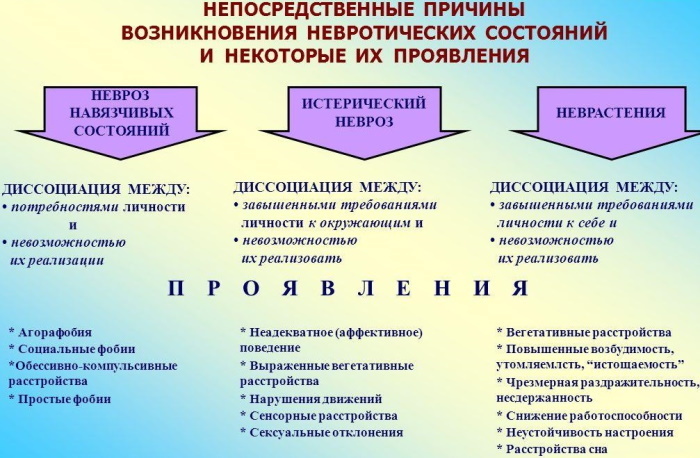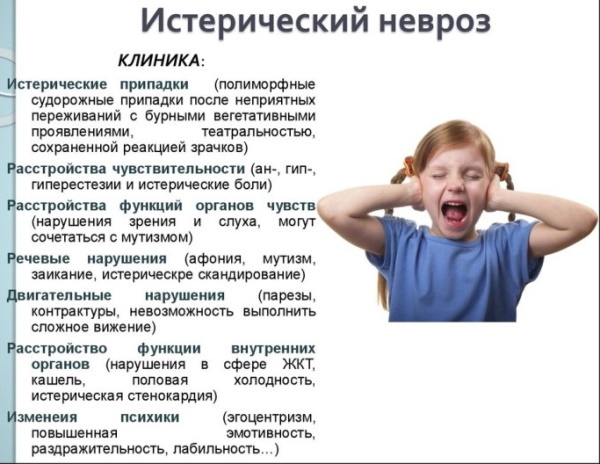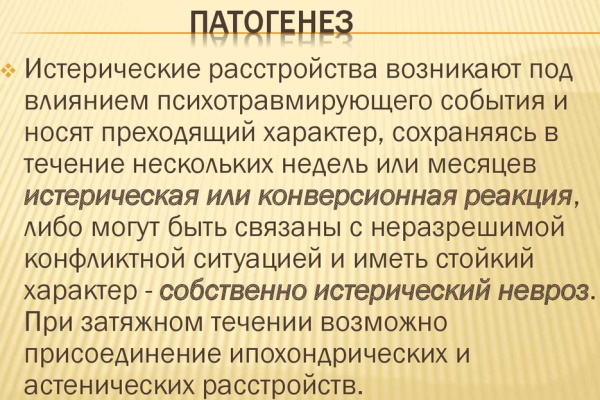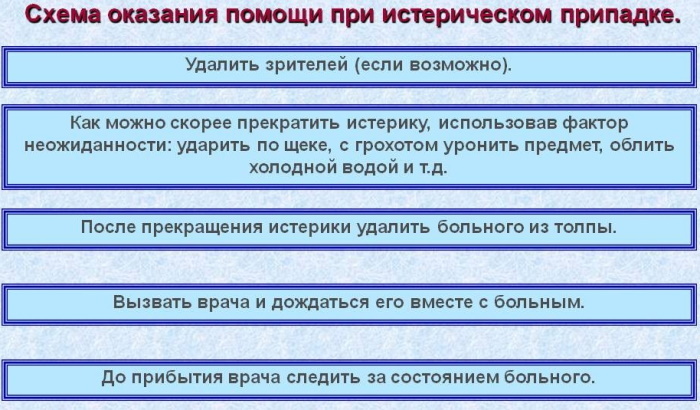Content
- Definition of hysteria in psychology
- Causes
- What are hysterical seizures?
- Clinical forms of hysteria and their symptoms and symptoms
- Everyday
- Stormy
- Self-affirming
- Silent
- Physiological
- Vindictive
- Sexy
- Tantrum treatment
- First aid for hysterical seizures
- Psychotherapy
- Drug therapy
- Folk remedies
- Forecast
- Video about hysteria in psychology
Often people try to draw attention to their person by behaving inappropriately or hysterically. To a greater extent, this is typical for women, but men can also give out unusual reactions in difficult stressful situations. Psychologists say that two female tantrums have to one is male, therefore it is not true to blame exclusively women for hysteria. It's just that the tantrums of the fair sex are usually more expressive and demonstrative.
Definition of hysteria in psychology
Hysteria in psychology is a special state when an individual gives way to his negative emotions while his consciousness narrows, for some time he ceases to behave adequately and can scream, sob, use foul language, behave violently.
Quite often, hysteria proceeds in waves and bouts of crying and lamentation are replaced by unnatural laughter, and then sobs and curses are repeated again. Giving an outlet to accumulated negative emotions during a hysteria, a person does not control himself well, to be "not in himself", begins to think worse. That is why psychologists and psychiatrists believe that at the moment of hysteria, the consciousness of a person narrows.
Some people are more prone to hysterics and then they say about them that hysteria is one of their character traits. Such a feature of them determines that they are more often than others in a restless and agitated state and turn on those around them with their emotions.
Psychologists distinguish between 2 types of people with hysterical traits:
- the 1st type includes people suffering from various forms of neuroses and psychosomatic diseases;
- the second type includes manipulators who use hysteria for selfish purposes, in order to extract their own benefit and achieve their goals.

Hysteria in the behavior of both is expressed in approximately the same way:
- they deliberately dramatize various events and incidents;
- do their best to attract the attention of others and are upset if they fail;
- when making speeches, they speak very emotionally and expressively;
- do not hesitate, demonstrate a changeable mood;
- unreasonably criticize or, on the contrary, undeservedly idealize people;
- trying to influence others not only psychologically, but also visually, using bright, shocking clothes and cosmetics for this.
Causes
Initially, tantrums were considered a purely female prerogative and were explained by the peculiarities of female logic and the influence of hormones on the psycho-emotional state of the fair sex. Associated with this view is the fact that the word "hysterical" exists only in the feminine gender. It was also believed that children are often inclined to wear out for no reason due to the impossibility and inability, due to the immaturity of the psyche, to somehow express the accumulated emotions in some other way.
Over time, views changed, it became obvious that many men quite often express their emotions violently, falling into a hysterical state, like women. It's just that their tantrums are often not like women. They prefer to act more cunningly, deftly manipulating others, but they can also often be rude and aggressive and it happens that they cause harm to themselves or others by their actions, while female hysterics are less likely to carry serious destructive character.
Among the common causes of tantrums are the following:
| Desire to attract attention | Sometimes adults want to draw attention to themselves and at the same time they do not care at all what assessment of their actions will be given by others. |
| Character traits | Tantrums are typical for people suffering from various types of disorders - narcissistic, paranoid, obsessive-compulsive. Often, such individuals distortedly perceive reality and when they are pointed to this, then such comments cause anger in them. |
| The individual has addictions | Irrational outbursts serve as an excuse to justify your desire to use harmful substances (alcohol, drugs), since in this case an artificial stimulant acts as a kind of stress relief tool, which a person considers himself entitled to resort to to eliminate stress after demonstrative tantrums. |
| Switching attention | In some cases, a person may throw a tantrum wishing to divert attention from something else. So, for example, maybe when one of the partners was practically caught cheating, finding some circumstantial evidence, and he, wishing to divert attention from this topic, begins to strongly scandalize in another occasion. |
| Defense or regression | Hysteria in this situation acts as an unconscious psychological defense mechanism that a person uses when he feels vulnerable, weak. |
| Desire to manipulate | Hysteria is the most primitive way to achieve something and dishonest, unscrupulous people often use this technique, wanting to achieve their goals. |
| Shame, fear | In some cases, hysteria can be a reaction to a previously experienced severe stressful situation (rape, beatings). At the same time, any similar circumstances can provoke unpleasant memories in the victim and cause hysteria. |
| Guilt | Sometimes a person knows that he is to blame for something, but for some reason does not want to take responsibility and admit his mistakes, but chooses a different path - behaves defiantly, throwing tantrums and blaming what is happening others. |
What are hysterical seizures?
Hysteria in psychology is a kind of demonstrative manifestation of feelings by an individual when he is not agree, wants to achieve his goal, or is overwhelmed by negative emotions that he has accumulated for a long time yourself.
Usually, tantrums proceed in the form of seizures - an acute form of manifestation of disagreement with a situation that does not meet the requirements, desires and expectations of the individual. Seizures are a form of provocation and protest and have a specific end goal - to get attention, get what you want, and get personal gain.
Outwardly hysterical seizures can be expressed in a very diverse way. A tantrum may look like an epileptic seizure, resemble a stroke, and be accompanied by tremors in the body.
Unlike the loss of consciousness during an epileptic seizure or stroke, during hysterics, a person does not completely lose the ability to control his body. His consciousness from surging emotions may narrow (or may not narrow if the hysteria is demonstrative in nature), but he does not completely lose control over himself. In a hysterical seizure, a person can fall, but he does it carefully, whereas in a stroke, epilepsy such an action becomes difficult to control and the individual can lose consciousness anywhere and be injured wherein.
During a tantrum, people can wring their elbows, arch themselves, pull out their hair, scream, cry, repeat the same thing (swear words, curses, lamentations), make senseless chaotic movements with your hands and feet. However, all these actions are most often of a disorderly nature and are deliberately demonstrated to other people in order to influence them.
However, this does not mean at all that if a person has a hysteria, then you should not pay attention to him. If such a loss of self is provoked by a traumatic situation, accumulated negative emotions, then the person should be helped to calm down and try to switch him to something else. If the hysteria is feigned and is used only for manipulative purposes, then it is worth giving the opportunity an individual to be alone and come to his senses and then act and build relationships with him, depending on the development situations.
Clinical forms of hysteria and their symptoms and symptoms
Tantrum is inappropriate, sometimes destructive behavior of a person, which can be a reaction to adverse factors affecting his psyche, and may be a way to manipulate the consciousness of others of people. Psychologists distinguish between several types of tantrums, depending on the characteristics of the reasons provoking their occurrence, as well as characteristic symptoms.
Everyday
Such tantrums can be routine, common in nature and happen quite often. Women are more susceptible to them, especially in the premenstrual period.
The peculiarity of this kind of hysterics is that they do not touch deep serious issues and, as a rule, are character (nothing to wear, I want to go on vacation, tired of the monotony, annoying the need for daily home maintenance farms). This condition is usually predictable and, with the right response from others, is short-lived and safe.
Stormy
This hysteria is always loud and is accompanied by serious statements like “you stole / stole my life and my best years from me "," because of you / your jealousy / greed / I have nothing it happened ". Typically, manipulators act in this way, wishing to attract attention to themselves and encourage others to take action.

At the same time, violent tantrums, unlike everyday scandals, are more emotional and often lead to serious scandals, as a result of which the parties may quarrel in the end. If we talk about violent family conflicts, accompanied by tantrums of parents, then often in such situations little ones suffer. children who, observing the inappropriate behavior of mom and dad, are very frightened and, understanding little, can blame for what happened myself.
Self-affirming
It can also be described as demonstrative, since in this case the scandalous person not only does not hide that he is prone to hysteria, but proudly declares it. This is done not only in order to test the patience of the people around them, but also to increase their importance in their eyes.
However, usually individuals prone to such hysterics allow themselves to behave this way only with those who are included in their closest social circle, since the phrases “you you know what will happen now if you don’t do as I want ”it is rather difficult to influence strangers or people who are not particularly interested in communication.
Silent
The most dangerous and unpredictable type of hysteria, since it is outwardly difficult to understand that a person is planning something bad. With such a hysteria, dishes do not defiantly beat and they do not attack the offender with fists and curses.
In this situation, a person is looking for other ways to get out of his emotions and will definitely find it. It can be a scratched or painted car, cut clothes, an unexpected physical blow. The person who extinguished the hysterics in this case does not abandon the idea of conveying his indignation and can act delayed and often more violently.
Physiological
It is associated with a physiological imbalance in the body, when a person is really tired of constant stress and lack of sleep. It is more often manifested in women, when premenstrual mental tension is supplemented by stressful situations at work, in the family. At these moments, the fair sex needs rest, moral and physical help, since accumulated fatigue can provoke serious outbursts of aggression and frequent and prolonged tantrums.
Vindictive
In such a state, a person tries to behave as if nothing happened and everything is fine, but his behavior, words and deeds indicate the opposite.
He can:
- to sob quietly (usually women do this), being near to be detached, indifferent;
- demonstrate your helplessness;
- complain about injustice, which, in his opinion, happens only to him.

In this state, emotions sooner or later also find a way out. Anything can happen: a person can have a partner on the side, hire someone to spy on the 2nd half, in hoping to find out something compromising and use it for pressure and blackmail, set up or slander another to calm down your ego.
Sexy
The lack of regular sexual discharge leads to the accumulation of sexual energy, which is sublimated into a nervous, mentally unstable state. This does not mean that all single people are more prone to tantrums, but sexual satisfaction is one of the reasons for hysteria (especially in women).
Most often, such questions arise in couples where, due to disagreements (usually not related to intimate life) sex life went wrong and partners are forced to look for someone on the side. Not everyone goes to this, wanting to preserve the marriage and family, but at the same time they do not try to resolve the conflict, as a result of which scandals become the norm and the situation only worsens.
Tantrum treatment
Hysterics in psychology is an extremely vivid and expressive expression of emotions by an individual when he wants to achieve something (manipulates), is afraid of something, or protests against something. Hormonal disruptions, constant stress, lack of self-realization, problems in interpersonal relationships, nervous and mental disorders can provoke attacks of hysterics. In a sense, hysteria helps to dump the accumulated negativity, but such an expression of emotions usually helps. for a short time, therefore, to prevent the onset of such a condition and treat attacks of hysteria, you should take measures.
First aid for hysterical seizures
When you are near a person who has gone into hysterics, you should behave calmly and not show him your strong anxiety.
To stabilize the condition, it is necessary:
- invite him to drink a glass of water (to relieve stress, you can add a few drops of valerian or motherwort tincture);
- if he refuses, you can sprinkle a little water on his face or wet a towel and, if possible, apply to his face, forehead;
- give a person an opportunity to speak out (shout, cry), do not try to shame him and forbid him to express his emotions;
- calmly listen to everything that the person says;
- try to put the patient to bed, create a calm atmosphere;
- in case of completely inadequate behavior of a hysterical person, the appearance of strong aggression, hallucinations, delirium, an ambulance should be called immediately.
During an attack, it is impossible to prove to a person that all his problems are far-fetched. Such a devaluation of the feelings and state of the individual can only cause a new wave of aggression in him and intensify the attack.
Psychotherapy
Psychotherapy for hysteria is aimed at correcting the state of the patient's psyche.
Classes with a psychotherapist usually include:
- hypnotherapy - when a specialist uses hypnosis to change the basic attitudes formed in the mind of a person;
- autogenous training - the task of the psychotherapist in this case is to teach the patient self-hypnosis, during which he himself will give himself new correct attitudes;
- rational psychotherapy - it is based on the method of persuasion, with the help of which the doctor tries to eliminate the patient's painful internal constraints.
Thanks to these techniques, patients learn to adequately assess themselves and the events taking place.
An important role in working out hysterical triggers (tightly entrenched attitudes) of the personality is also played by occupational therapy, since it is employment that helps to distract from oppressive thoughts and helps cleanse head.
Drug therapy
In case of hysteria, people are additionally prescribed drug therapy, since often the reasons the occurrence of seizures are associated with existing depressions, neuroses, various mental disorders. Usually these are psychotropic substances - Phenibut, Phenazepam, Benzoclidine.
To prevent falling into an affective state, normotimics can be prescribed - drugs that help stabilize the mood in mentally ill patients. For sleep problems, such sleeping pills as Zopiclone, Zolpidem, Nitrazepam are effective. All of the above means can be used only as directed by a doctor, since they are potent psychotropic substances and are sold only by prescription.

In milder cases, when hysteria is not associated with severe depression, neurosis, or mental disorder, usually prescribe fortifying agents (vitamins) and preparations based on medicinal plants (chamomile, valerian, motherwort).
Folk remedies
Herbal medicine can be effective for mild to moderate neurotic disorders, and can also be an excellent adjunct to medication for more severe forms of hysteria. There are many recipes for infusions and fees that perfectly help to cope with anxiety, suspiciousness and worries.
A very effective remedy that includes:
- caraway;
- chamomile;
- valerian.
To prepare the infusion, take 1-2 tbsp. raw materials and pour boiling water (250-350 ml). The drink is infused for about 1 hour and then drunk in equal parts 3-4 times during the day. The collection helps to relax, restore restful sleep and the nervous system.
Also, herbs and plants such as:
- lemon balm;
- blooming Sally;
- peppermint;
- pharmaceutical camomile;
- valerian root.
All these herbal remedies have a sedative effect and help restore the nervous system and cope with depressive and hysterical conditions.
Forecast
Hysteria in psychology is an affective state into which a person enters under certain unfavorable circumstances:
- when he is scared;
- gets into a traumatic situation;
- seeks to protest against current events.
The prognosis for most people who tend to throw tantrums from time to time is generally favorable. In cases where hysteria is associated with the presence of serious mental pathologies, then longer therapy may be required to recover the patient.
So, for example, hysteria is difficult to correct when:
- anorexia;
- suicidal behavior;
- somnambulism (walking in a dream);
- organic lesions of the nervous system.
If there are psychological problems, the patient should not ignore them, but should try to deal with difficulties that arise, which will help him in the future to avoid the appearance of hysterical seizures and the development of severe depression.
Tantrum can act as a tool to manipulate other people, or it can be a sign of a serious illness. Psychologists believe that long-term repetitive tantrums should not be ignored and such conditions should be corrected with the help of medications and psychotherapy.
Prevention of the occurrence of these conditions is the ability to work out the arising psychological problems, understanding their condition and their needs, as well as help and support of loved ones.
Video about hysteria in psychology
Hysterical neurosis:
